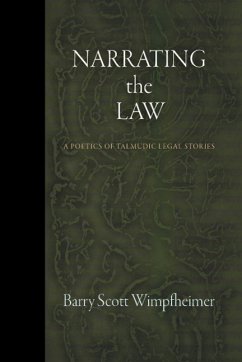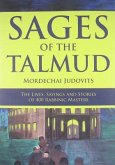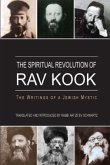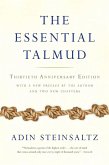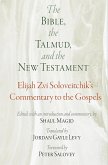Narrating the Law A Poetics of Talmudic Legal Stories Barry Scott Wimpfheimer "Well trained in the critical study of rabbinic literature and informed by previous philological scholarship as well as by critical theory, Wimpfheimer provides a model that has the potential to narrow the gap that has divided the two major vectors of rabbinic thinking, Halakhah and Aggadah, law and folklore. His exacting analysis of the literary genre of legal narrative puts this dichotomization into sharp relief."--Elliot R. Wolfson, New York University In Narrating the Law Barry Scott Wimpfheimer creates a new theoretical framework for considering the relationship between law and narrative and models a new method for studying talmudic law in particular. Works of law, including the Talmud, are animated by a desire to create clear usable precedent. This animating impulse toward clarity is generally absent in narratives, the form of which is better able to capture the subtleties of lived life. Wimpfheimer proposes to make these different forms compatible by constructing a narrative-based law that considers law as one of several "languages," along with politics, ethics, psychology, and others that together compose culture. A narrative-based law is capable of recognizing the limitations of theoretical statutes and the degree to which other cultural languages interact with legal discourse, complicating any attempts to actualize a hypothetical set of rules. This way of considering law strongly resists the divide in traditional Jewish learning between legal literature (Halakhah) and nonlegal literature (Aggadah) by suggesting the possibility of a discourse broad enough to capture both. Narrating the Law activates this mode of reading by looking at the Talmud's legal stories, a set of texts that sits uncomfortably on the divide between Halakhah and Aggadah. After noticing that such stories invite an expansive definition of law that includes other cultural voices, Narrating the Law also mines the stories for the rich descriptions of rabbinic culture that they encapsulate. Barry Scott Wimpfheimer teaches religion and law at Northwestern University. Divinations: Rereading Late Ancient Religion Jan 2011 264 pages 6 x 9 ISBN 978-0-8122-4299-7 Cloth $59.95s £39.00 World Rights Religion, Law Short copy: Narrating the Law: A Poetics of Talmudic Legal Stories creates a new theoretical framework for considering the relationship between law and narrative, models a new method of studying Talmudic law, and fills out the picture of the cultural life of the rabbis who contributed to the Talmud.

